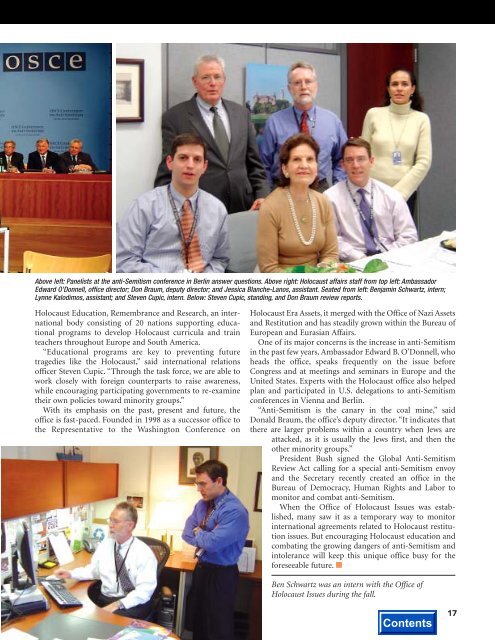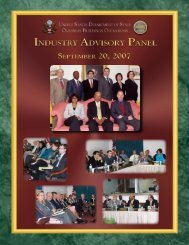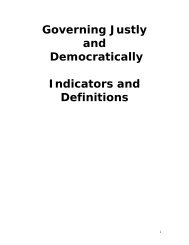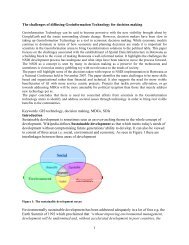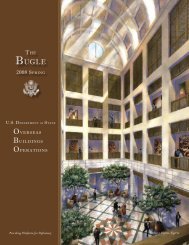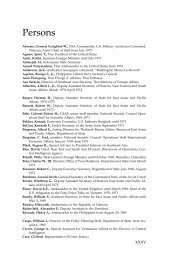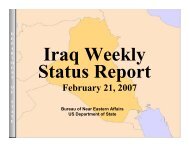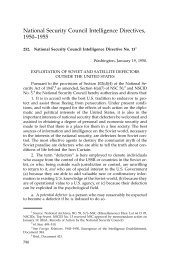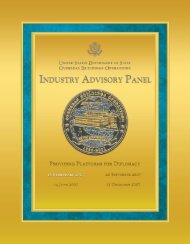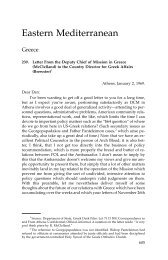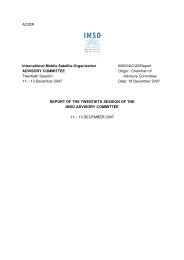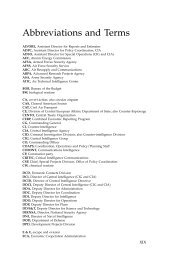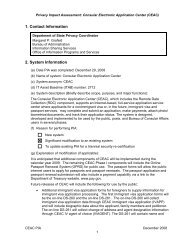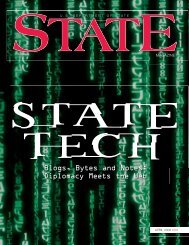about RNet - US Department of State
about RNet - US Department of State
about RNet - US Department of State
Create successful ePaper yourself
Turn your PDF publications into a flip-book with our unique Google optimized e-Paper software.
Above left: Panelists at the anti-Semitism conference in Berlin answer questions. Above right: Holocaust affairs staff from top left: Ambassador<br />
Edward O’Donnell, <strong>of</strong>fice director; Don Braum, deputy director; and Jessica Blanche-Lanos, assistant. Seated from left: Benjamin Schwartz, intern;<br />
Lynne Kalodimos, assistant; and Steven Cupic, intern. Below: Steven Cupic, standing, and Don Braum review reports.<br />
Holocaust Education, Remembrance and Research, an international<br />
body consisting <strong>of</strong> 20 nations supporting educational<br />
programs to develop Holocaust curricula and train<br />
teachers throughout Europe and South America.<br />
“Educational programs are key to preventing future<br />
tragedies like the Holocaust,” said international relations<br />
<strong>of</strong>ficer Steven Cupic. “Through the task force, we are able to<br />
work closely with foreign counterparts to raise awareness,<br />
while encouraging participating governments to re-examine<br />
their own policies toward minority groups.”<br />
With its emphasis on the past, present and future, the<br />
<strong>of</strong>fice is fast-paced. Founded in 1998 as a successor <strong>of</strong>fice to<br />
the Representative to the Washington Conference on<br />
Holocaust Era Assets, it merged with the Office <strong>of</strong> Nazi Assets<br />
and Restitution and has steadily grown within the Bureau <strong>of</strong><br />
European and Eurasian Affairs.<br />
One <strong>of</strong> its major concerns is the increase in anti-Semitism<br />
in the past few years. Ambassador Edward B. O’Donnell, who<br />
heads the <strong>of</strong>fice, speaks frequently on the issue before<br />
Congress and at meetings and seminars in Europe and the<br />
United <strong>State</strong>s. Experts with the Holocaust <strong>of</strong>fice also helped<br />
plan and participated in U.S. delegations to anti-Semitism<br />
conferences in Vienna and Berlin.<br />
“Anti-Semitism is the canary in the coal mine,” said<br />
Donald Braum, the <strong>of</strong>fice’s deputy director. “It indicates that<br />
there are larger problems within a country when Jews are<br />
attacked, as it is usually the Jews first, and then the<br />
other minority groups.”<br />
President Bush signed the Global Anti-Semitism<br />
Review Act calling for a special anti-Semitism envoy<br />
and the Secretary recently created an <strong>of</strong>fice in the<br />
Bureau <strong>of</strong> Democracy, Human Rights and Labor to<br />
monitor and combat anti-Semitism.<br />
When the Office <strong>of</strong> Holocaust Issues was established,<br />
many saw it as a temporary way to monitor<br />
international agreements related to Holocaust restitution<br />
issues. But encouraging Holocaust education and<br />
combating the growing dangers <strong>of</strong> anti-Semitism and<br />
intolerance will keep this unique <strong>of</strong>fice busy for the<br />
foreseeable future. ■<br />
Ben Schwartz was an intern with the Office <strong>of</strong><br />
Holocaust Issues during the fall.<br />
APRIL 2005<br />
17


